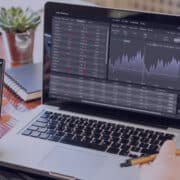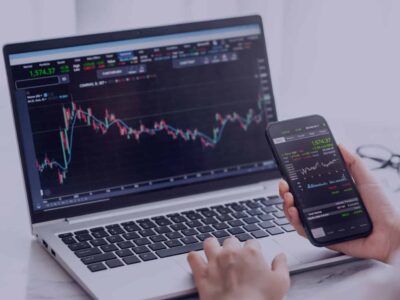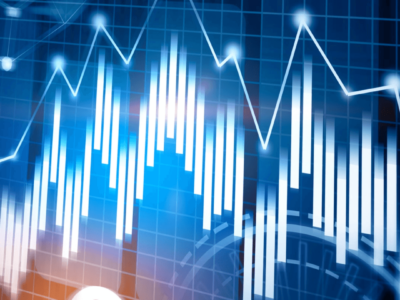GPD is considered the ultimate measure to track a nation’s economic health and growth. A GDP rate that increases shows that a country’s economy is growing, whereas a negative GDP means the country is going through a recession.
According to the International Monetary Fund, the top 5 highest-ranked countries for GDP in 2020 are:
- China: $23.5 trillion
- USA: $20.9 trillion
- India: $8.1 trillion
- Japan: $5.3 trillion
- German: $4.5 trillion
According to these stats, it shows that these countries have the largest economies in the world. As we can see the USA and China are in the double figures and there is a considerable gap between them and the rest of the countries.
Real GDP forecast
How do we track the economy with GDP?
We need to understand first what the GDP is and the factors that make up this indicator.
GDP stands for Gross Domestic Product.
The calculation for GDP is:
C + I + G + NX = GDP
C: consumption = the sum of consumer spending
I: investments = the sum of a business’s capital spending
G: government = the sum of government spending
NX: net exports = (total exports – total imports)
How does GDP affect the economy?
-
Consumption
Consumption refers to the total of consumer spending. It is the money we as consumers spend on goods and services. Goods include food, appliances, vehicles, basic needs, etc. Services refer to getting a car wash, haircut, garden services, domestic services, etc.
In developed countries like the USA and UK, consumer spending makes up 50% of their GDP.
-
Investments
Investments include expenditures of businesses as well as property investments that consumers make. During a financial crisis, like the 2008 recession, investments were down because companies could not expand and cut costs to save money.
-
Government spending
Government spending includes national and local spending, like education (schools, colleges, and universities), health care, defense force, and public transportation. But it differs from country to country.
Some countries, for example, do not pay for certain public goods and services like private health care, whereas other countries pay for schools and universities in total, and their inhabitants do not have to pay for schooling.
In the US, for example, government spending makes up about 35% of the GDP, in contrast to Finland, where it makes up 53% of their GDP. Finland’s government expenditure is higher than the USA’s.
-
Net exports
Nett exports are the total exports minus total imports. If a country’s net exports are negative, it means it exports less than it imports. A positive net export value means the exports are higher than imports, contributing to a good GDP. A country with high net exports has a high demand for its goods.
Germany has the highest value of net exports, followed by Japan and China. Germany’s most significant exports are cars and machinery, and Japan’s are cars and electronics. China exports mainly electronics and consumer goods to countries across the world.
How does the GDP impact investors?
If you’re an investor, you know that you have to keep an eye on specific critical economic indicators. For example, the GDP impacts the stock market, even though it’s a lagging indicator because it grounds historical performance.
Some economists argue that there is no correlation between stock prices and a country’s GDP. But a good GDP does indicate that corporate spending has increased, therefore favoring the stock market.
Since investments are long-term, investors do not solely rely on the current GDP but instead on time. The growth rate is an indication of whether the economy is growing or declining.
How does the GDP impact the traders?
On the other hand, traders are short-term investors looking to profit quicker than long-term stock investors. Traders rely on economic indicators because of the volatility it creates in the market.
For example, forex traders would wait for the final GDP numbers to be released, and if these are good, it would generally strengthen the country’s currency. So, it is an opportunity to profit from the market instantly.
At the same time, a lower-than-expected GDP score might weaken the currency. For forex traders, whatever the outcome is, they follow the market and trade the trend.
Here we look at an example of how the EUR/USD was affected by GDP release:
- In the above image is the EUR/USD 1-hour time frame price chart.
- The exchange rate fell from around 1.4200 to a support zone of about 1.4050.
- The GDP data was released on 28 March 2011 at 08:30, and the reading was 1.8%, lower than what was forecasted (1.9%).
- This caused the EUR to gain the strength of about 50 pips to 1.4100.
- However, the growth rate was lower than the previous quarter at 3.1%.
- The EUR then retracted back to support and gained strength back to 1.4200 resistance level.
As a currency trader, you could easily take a buy at the support level with a small risk of 30 pips and take profit at the resistance of 1.4200.
Conclusion
We can see that the GDP is significant in tracking a country’s economy. For an economy to grow, all the components that make up the GDP have to perform well. It might not be the primary driver for investors, but it impacts their decision when deciding which stocks to purchase.
Since investing is long-term, a weaker GDP is not a guarantee of future performance, especially in a country like the USA, where the economy is generally strong. Investors might not invest in companies if the country itself has a declining GDP rate.
However, as a forex trader, you can use the opportunity to profit by trading the trend based on the report’s outcome.















Comments